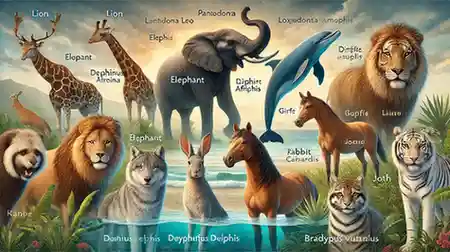The scientific name of animals is Animalia.
The scientific name for animals as a whole is Animalia. Biology values the study of animals and their scientific names and classifications. Each species is given a scientific name according to the binomial nomenclature system. This article presents a list of scientific names for animals, which should provide an understanding of their animals scientific names and classification.

Table of Contents
What Is the Scientific Name?
The scientific name has two segments, i.e., the genus and the species. These names are Latin words that allow scientists to avoid any confusion that could arise due to local vernacular names.
Why Are Scientific Names So Important?
- They provide a universal naming system.
- They prevent the misidentification of species.
- They assist in the study of evolutionary relationships.
If you want to know the animals’ scientific names, this list will help you learn them quickly.
90 Animals and Its Scientific Names
A list of scientific names of animals, categorized into mammals, birds, reptiles, amphibians, fish, and insects.
Mammals Animals Scientific name
1. Domestic mammals Animals Scientific Names
These animals are considered domestic mammals and live together with humans or near them. Their association includes domestication for companionship or breeding as a labor unit or pet and, in most cases, for edible food production.
| DOMESTIC ANIMAL NAME | SCIENTIFIC NAME |
|---|---|
| Dog | Canis lupus familiaris |
| Cat | Felis catus |
| Horse | Equus ferus caballus |
| Cow | Bos taurus |
| Goat | Capra aegagrus hircus |
| Sheep | Ovis aries |
| Pig | Sus scrofa domesticus |
| Donkey | Equus africanus asinus |
| Buffalo | Bubalus bubalis |
| Rabbit | Oryctolagus cuniculus |
| Camel | Camelus dromedarius |
| Yak | Bos grunniens |
| Guinea Pig | Cavia porcellus |
| Llama | Lama glama |
| Alpaca | Vicugna pacos |
2. Wild Mammals Animals Scientific Names
Wild mammals are found in forests, mountains, and grasslands. They are not domesticated animals and usually possess several adaptations to survive.
| WILD ANIMAL NAME | SCIENTIFIC NAME |
|---|---|
| Lion | Panthera Leo |
| Tiger | Pantheta Tigris |
| Loepard | Panthera pardus |
| Cheetah | Acinonyx jubatus |
| Elephant | Loxodonta africana |
| Giraffe | Giraffa camelopardalis |
| Bear | Ursus arctos |
| Wolf | Canis lupus |
| Bison | Bison bison |
| Gorilla | Gorilla gorilla |
| Hyena | Crocuta crocuta |
| Rhinoceros | Rhinoceros unicornis |
| Jaguar | Panthera onca |
| Baboon | Papio anubis |
| Chimpanzee | Pan troglodytes |
3. Desert Mammals Animal Scientific Names
Desert mammals have adapted to extreme temperatures and scarce water availability.
| DESERT ANIMAL NAME | SCIENTIFIC NAME |
|---|---|
| Fennec Fox | Vulpes zerda |
| Jerboa | Jaculus jaculus |
| Kangaroo Rat | Dipodomys deserti |
| Dormedary Camel | Camelus dromedarius |
| Arabian Oryx | Oryx leucoryx |
| Sand Cat | Felis margarita |
| Meerkat | Suricate Suricatta |
| Desert Hedgehog | Paraechinus aethiopicus |
| Addax Antelope | Addax nasomaculatus |
| Kit Fox | Vulpes macrotis |
| Gila Monster | Heloderma suspectum |
| Rock Hyrax | Procavia capensis |
| Bactrian Camel | Camelus bactrianus |
| Ground Squirrel | Xerus inauris |
| Pallid Bat | Antrozous pallidus |

4. Marine Mammals Scientific Names
Marine mammals live in oceans and seas. They are adapted to aquatic life but need to breathe air.
| MARINE ANIMAL NAME | SCIENTIFIC NAME |
|---|---|
| Dolphin | Delphinus delphis |
| Orca (Killer Whale) | Orcinus orca |
| Blue Whale | Balaenoptera musculus |
| Humpback Whale | Megaptera novaeangliae |
| Sperm Whale | Physeter macrocephalus |
| Manatee | Trichechus manatus |
| Dugong | Dugong dugon |
| Sea Otter | Enhydra lutris |
| Walrus | Odobenus rosmarus |
| Harbor Seal | Phoca vitulina |
| Narwhal | Monodon monoceros |
| Beluga Whale | Delphinapterus leucas |
| Gray Whale | Eschrichtius robustus |
| Elephant Seal | Mirounga leonina |
| Bottlenose Dolphin | Tursiops truncatus |

5. Rainforest Mammals Scientific Names
Rainforests are home to many unique mammals with special adaptations for survival.
| RAINFOREST ANIMAL NAME | SCIENTIFIC NAME |
|---|---|
| Orangutan | Pongo pygmaeus |
| Sloth | Bradypus variegatus |
| Capuchin Monkey | Cebus capucinus |
| Jauar | Panthera onca |
| Tapir | Tapirus terrestris |
| Ocelot | Leopardus pardalis |
| Howler Monkey | Alouatta palliata |
| Squirrel Monkey | Saimiri sciureus |
| Coati | Nasua nasua |
| Tamandua (Anteater) | Tamandua tetradactyla |
| Kinkajou | Potos flavus |
| Armadillo | Dasypus novemcinctus |
| Bush Dog | Speothos venaticus |
| Margay | Leopardus wiedii |
| Pace | Cuniculus paca |
Birds Animals Scientific Names
| BIRD ANIMAL NAME | SCIENTIFIC NAME |
|---|---|
| Bald Eagle | Haliaeetus leucocephalus |
| Pigeon | Columba livia |
| Peacock | Pavo cristatus |
| Parrot | Psittaciformes |
| Crow | Corvus brachyrhynchos |
| Ostrich | Struthio camelus |
| Sparrow | Passer domesticus |
| Penguin | Aptenodytes forsteri |
| Owl | Strigiformes |
| Flamingo | Phoenicopterus roseus |
Reptile Animals Scientific Names
| REPTILE ANIMAL NAME | SCIENTIFIC NAME |
|---|---|
| Crocodile | Crocodylus niloticus |
| Snake | Serpentes |
| Tortoise | Testudinidae |
| Chameleon | Chamaeleonidae |
| Komodo Dragon | Varanus komodoensis |
| Python | Pythonidae |
| Cobra | Naja naja |
| Gecko | Gekkonidae |
| Iguana | Iguana iguana |
| Alligator | Alligator mississippiensis |
Amphibians Animals Scientific Names
| AMPHIBIAN ANIMAL NAME | SCIENTIFIC NAME |
|---|---|
| Frog | Anura |
| Toad | Bufonidae |
| Salamander | Caudata |
| Newt | Pleurodelinae |
| Axolotl | Ambystoma mexicanum |
| Tree Frog | Hylidae |
| Bullfrog | Lithobates catesbeianus |
| Fire Salamander | Salamandra salamandra |
| Glass Frog | Centrolenidae |
| Tiger Salamander | Ambystoma tigrinum |
Fish Animals Scientific Names
| FISH ANIMAL NAME | SCIENTIFIC ANIMAL NAME |
|---|---|
| Shark | Selachimorpha |
| Goldfish | Carassius auratus |
| Salmon | Salmo salar |
| Tuna | Thunnus thynnus |
| Piranha | Pygocentrus nattereri |
| Eel | Anguilliformes |
| Stingray | Dasyatidae |
| Betta Fish | Betta splendens |
| Catfish | Siluriformes |
| Swordfish | Xiphias gladius |
Final Thoughts
The list of scientific names for animals gives us some idea of the diversity of life on planet Earth. Each of these animal name scientific classifications adheres to a commonly used nomenclature system applicable worldwide. Their scientific names flash into the biology of all these wild mammals, domestic animals, and marine life.
Discover more animals and their scientific names and extend your search for fanciful creatures!
Frequently Asked Questions (FAQs)
Q1: Why do animals have scientific names?
Scientific names standardize classification worldwide, avoiding confusion from different common names.
Q2: What is the difference between a common name and a scientific name?
A familiar name differs from country to country, while a scientific name is an international and universally accepted name based on Latin classification.
Q3: How are scientific names written?
Scientific names are in the format Genus + species, Italics, where the first capitalizes the genus and the species is written in small letters (e.g., Canis lupus).


You will not prompt to me, where I can find more information on this question?